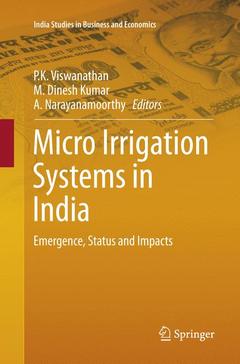Micro Irrigation Systems in India, Softcover reprint of the original 1st ed. 2016 Emergence, Status and Impacts India Studies in Business and Economics Series
Coordonnateurs : Viswanathan P K, Kumar M. Dinesh, Narayanamoorthy A.

This book takes stock of micro irrigation systems (MIS), the technological intervention in India?s agricultural and water management sectors, over the past couple of decades. Based on empirical research from the major agriculturally dynamic states, viz., Gujarat, Rajasthan, Maharashtra, Tamil Nadu, Andhra Pradesh and Karnataka, the book provides a nuanced understanding and objective assessment of the implementation and adoption of MIS across these states. It addresses several of the questions related to adoption and impacts of MIS in India. On the adoption side, the key question that the book addresses is which segment of the farming community adopts MIS across states? The impacts analysed include those on physical, agronomic and economic aspects. At the macro level, the question being asked is about the future potential of MIS in terms of saving water from agriculture and making more water available for environment. The book also addresses the question of the positive/negative externalities and real social benefits and costs from the use of MIS, a major justification for heavy capital subsidies for its purchase by farmers. It also brings out certain critical concerns pertaining to MIS adoption, which need to be addressed through more empirical research based on longitudinal panel/ cross sectional data. The book would be of great use to researchers (agricultural water management, irrigation economics), students of water resource engineering, irrigation engineering and water resources management, as well as to policy makers and agricultural water management experts ? national and international.
P.K. Viswanathan is a PhD in Economics from Institute for Social and Economic Change, Bangalore. He started his academic career in 1994 as a Scientist (Eco.) at the Rubber Research Institute of India. He was a Post-Doctoral Fellow at the Asian Institute of Technology (AIT) Bangkok during 2005 and later at the Institute for Population and Social Research, Mahidol University, Thailand during 2006-07. Since 2007, he has been working as Associate Professor, Gujarat Institute of Development Research, Ahmedabad, India. Areas of his research interests include: economics and management of natural resources; analysis of water institutions and policies; agrarian transformation and rural livelihoods; economics of climate change and conservation of natural resources. He also teaches a course on Environmental Management and Sustainable Development at the Amrita School of Business, Amrita University, Cochin. He also had worked as an International Consultant for Agricultural Census Studies,FAO of the United Nations, Lao PDR, Vientiane.
M. Dinesh Kumar is a Ph. D in Water Management, and has 25 years of professional experience undertaking research, action research, field implementation, consulting and training in the field of water resources. He is currently the Executive Director of Institute for Resource Analysis and Policy (IRAP) in Hyderabad, India. He has nearly 150 publications to his credit, including five books, three edited volumes, and several papers in international journals. His internationally acclaimed works are on virtual water trade, energy-groundwater nexus, agricultural water productivity, economics of water harvesting and artificial groundwater recharge, and water management in river basins and integrated urban water management. He is associate Editor of Water Policy and Member of the Editorial Board of Int. Journal of Water Resources Development.
A. Narayanamoorthy is presently working as Professor and Head, DDate de parution : 04-2018
Ouvrage de 178 p.
15.5x23.5 cm
Date de parution : 03-2016
Ouvrage de 178 p.
15.5x23.5 cm
